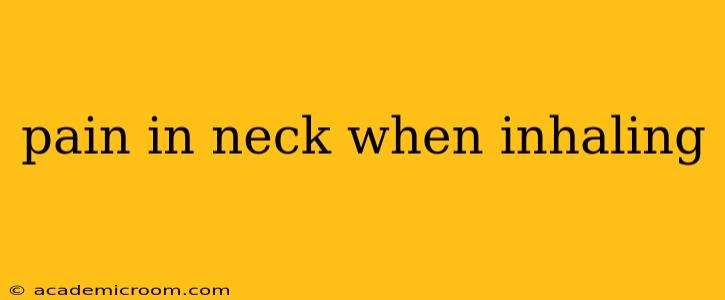Experiencing pain in your neck when you inhale can be alarming and debilitating. This symptom isn't a disease itself, but rather a sign that something may be amiss. The pain can range from a mild ache to a sharp, stabbing sensation, and its location can vary. Understanding the potential causes is crucial for effective management. This comprehensive guide explores various reasons why you might experience this discomfort and outlines appropriate steps to address it.
What Causes Neck Pain When Breathing In?
Several factors can contribute to neck pain during inhalation. It's often linked to musculoskeletal issues, but underlying medical conditions can also play a role. Let's explore some of the most common culprits:
1. Muscle Strain or Injury:
This is arguably the most frequent cause. Overuse, poor posture, sudden movements (like whiplash), or even sleeping in an awkward position can strain neck muscles. When you inhale, the muscles in your neck and upper back work to expand your chest cavity, exacerbating pain if already strained or injured. This can manifest as stiffness, soreness, or a sharp pain localized to specific muscles.
2. Cervical Spondylosis (Osteoarthritis of the Neck):
As we age, the cartilage between our vertebrae can wear down, leading to bone spurs and narrowing of the space between the vertebrae (spinal stenosis). This condition, known as cervical spondylosis, can cause pain, stiffness, and radiating pain into the arms and shoulders. The act of breathing may further compress the already narrowed spaces, leading to increased pain during inhalation.
3. Herniated Disc:
A herniated disc occurs when the soft inner portion of an intervertebral disc pushes out through a tear in the outer layer. This can impinge on nerves in the neck, causing pain that may worsen with deep breaths. The pressure changes during inhalation can aggravate the nerve irritation.
4. Referred Pain:
Pain in your neck might not originate in your neck at all. Conditions affecting organs in the chest, such as pneumonia, pleurisy (inflammation of the lining of the lungs), or even a heart attack, can cause referred pain in the neck. In these instances, the pain during inhalation is a symptom of a more serious underlying condition.
5. Costochondritis:
This condition involves inflammation of the cartilage that connects the ribs to the breastbone. While the pain is typically felt in the chest, it can sometimes radiate to the neck, particularly when breathing deeply.
6. Temporomandibular Joint (TMJ) Disorders:
Problems with the TMJ, the joint connecting your jaw to your skull, can sometimes cause referred pain to the neck. This is because the muscles and nerves of the jaw and neck are interconnected. Inhaling might exacerbate this pain, especially if you're clenching your jaw.
7. Thoracic Outlet Syndrome:
This syndrome involves compression of nerves or blood vessels in the space between your collarbone and first rib. The compression can cause pain in the neck, shoulder, and arm, often worsened by deep breathing.
How is Neck Pain When Breathing Diagnosed?
Diagnosing the cause of neck pain during inhalation requires a thorough evaluation. A doctor will typically conduct a physical exam, checking your range of motion, palpating for tenderness, and assessing your posture. They may also order imaging tests such as X-rays, CT scans, or MRI scans to visualize the structures in your neck and rule out more serious conditions like herniated discs or spinal stenosis. In some cases, further tests might be necessary to diagnose underlying medical problems.
What Treatments Are Available for Neck Pain During Inhalation?
Treatment depends on the underlying cause. Options include:
- Pain Relief Medication: Over-the-counter pain relievers like ibuprofen or acetaminophen can help manage pain and inflammation.
- Physical Therapy: A physical therapist can teach you exercises to strengthen your neck muscles, improve posture, and increase flexibility.
- Chiropractic Care: Chiropractic adjustments may help to realign the spine and alleviate pain.
- Massage Therapy: Massage can help relax tense neck muscles and reduce pain.
- Heat or Ice Packs: Applying heat or ice packs to your neck can help reduce pain and inflammation.
- Steroid Injections: In some cases, steroid injections can reduce inflammation and pain.
- Surgery: In rare cases, surgery may be necessary to address conditions such as a herniated disc or spinal stenosis.
When Should I See a Doctor?
If your neck pain during inhalation is severe, persistent, or accompanied by other symptoms such as fever, numbness, weakness, or shortness of breath, seek immediate medical attention. These symptoms could indicate a more serious underlying condition.
Can Neck Pain When Inhaling Be Prevented?
While not all causes of neck pain are preventable, adopting healthy habits can significantly reduce your risk. These include maintaining good posture, exercising regularly, practicing stress management techniques, and avoiding repetitive movements that strain your neck.
How Long Does Neck Pain When Inhaling Last?
The duration of neck pain during inhalation varies greatly depending on the underlying cause and treatment received. Minor strains may resolve within a few days or weeks with self-care measures. However, more serious conditions may require ongoing management.
What Exercises Help Neck Pain When Inhaling?
Gentle range-of-motion exercises and stretches can be beneficial, but it's essential to consult with a physical therapist or healthcare professional before starting any new exercise program. They can create a tailored plan that's safe and effective for your specific condition.
This information is for educational purposes only and does not constitute medical advice. Always consult with a healthcare professional for diagnosis and treatment of any medical condition.
